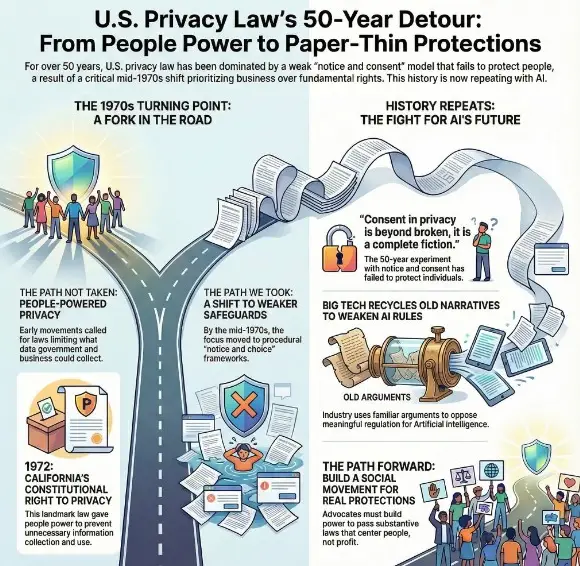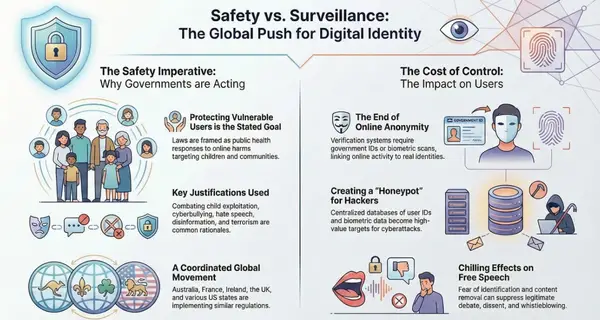Brussels Resurrects Chat Control 2.0 Through the Back Door: 'Risk Mitigation' is Mass Surveillance Rebranded

They said it was dead. They lied.
On October 14, 2025, after three failed attempts and massive public opposition, EU officials claimed Chat Control was "off the table." Privacy advocates cautiously celebrated. Tech companies breathed a sigh of relief. Citizens thought their digital rights were safe.
They were wrong.
Just one month later, Brussels is sneaking Chat Control back through the back door—rebranded as "risk mitigation" in Article 4 of a new compromise proposal rushed through EU working groups on November 12, 2025.
The playbook is familiar: Change the name. Keep the surveillance.
"Risk mitigation" is just the new label for:
- Forcing providers to scan all private messages (including encrypted chats)
- Weakening end-to-end encryption through client-side scanning
- Erasing online anonymity with mandatory age verification
- Locking teens out of basic messaging apps and social media
- Building the infrastructure for permanent mass surveillance
Call it what it is: Not child protection, but the construction of a mass-surveillance machine disguised as safety legislation.
This must be stopped. Again.
The Bait-and-Switch: How Chat Control Became "Risk Mitigation"
October 14: The False Victory
When the scheduled vote failed on October 14, 2025, digital rights organizations declared victory. As we documented, the proposal had been defeated three times since its introduction in May 2022, with Germany leading a blocking minority that killed mandatory encryption-breaking measures.
The promises made:
- "Mandatory Chat Control is off the table"
- "We respect encryption"
- "Member states have spoken clearly"
- "We're moving in a different direction"
The reality now revealed:
- Chat Control was only shelved in name
- The surveillance mechanism was repackaged, not removed
- "Voluntary" scanning became "risk mitigation measures"
- Encryption-breaking returns through regulatory loopholes
November 12-14: The Resurrection
Working quickly and quietly, EU officials resurrected Chat Control under new terminology:
November 12, 2025: The Law Enforcement Working Party met in the EU Council to discuss a new "compromise proposal" (Document 14092/25).
November 14, 2025: The proposal moved to Coreper (Committee of Permanent Representatives) for approval—without meaningful public debate or scrutiny.
The timing is telling: Rush it through before anyone notices. Get it approved before opposition mobilizes. Lock in surveillance infrastructure while claiming to have listened to privacy concerns.
Leading privacy advocate Patrick Breyer warned:
"The EU is playing us for fools. Following loud public protests, several member states said 'No' to indiscriminate Chat Control. Now it's coming back through the back door."
Article 4: The Trojan Horse
The Loophole That Swallows Privacy
The entire scheme hinges on Article 4 of the new proposal, innocuously titled "Risk Mitigation Measures."
The language:
Providers of email, chat and messenger services shall take "all appropriate risk mitigation measures."
Sounds reasonable, right?
Here's what it actually means:
Since "voluntary" scanning can be considered an "appropriate" risk mitigation measure, authorities can enforce mandatory implementation without calling it "mandatory."
The mechanism:
- Provider operates encrypted messaging service
- Regulator deems service "high risk" for child abuse material
- Regulator demands "risk mitigation measures" be implemented
- Provider must implement scanning or face enforcement action
- "Voluntary" becomes mandatory through regulatory pressure
It's the same coercion playbook we've seen before:
- UK Online Safety Act: "Voluntary" client-side scanning enforced through 10% revenue fines
- Australia age verification: "Industry-led" solutions mandated by law
- US EARN IT Act: "Optional" encryption weakening required to avoid liability
Call it "risk mitigation," but it's mandatory surveillance with a euphemistic label.
What "Risk Mitigation" Actually Requires
Under Article 4, providers would be obligated to:
1. Scan All Private Messages
Not just images—texts and metadata too:
- Every message you send analyzed by AI algorithms
- Metadata logged (who you talk to, when, how often)
- Pattern analysis to detect "suspicious" communication
- All happening before encryption protects your privacy
2. Implement Client-Side Scanning
Your device becomes the surveillance agent:
- Messages scanned on your phone before encryption
- AI models running locally, checking every photo
- Hashes compared against government databases
- Flagged content potentially blocked or reported
As we detailed in our UK upload prevention analysis, client-side scanning destroys encryption by inspecting content before it's protected.
3. Break End-to-End Encryption
The proposal explicitly targets encrypted services:
- Even client-side scanning could soon become mandatory
- WhatsApp, Signal, Telegram forced to scan messages
- The end of secure encryption as a practical matter
- Privacy exists in name only if messages are scanned first
4. Verify User Ages
Mandatory age verification requirements mean:
- Government-issued ID submission for all users
- Biometric scans (face recognition, fingerprints)
- Database matching and persistent digital identity
- Anonymity becomes impossible
The global age verification disaster we documented is now coming to the EU through Chat Control's back door.
5. Lock Teens Out of Apps
Article 6 would prevent users under 16 from:
- Installing encrypted messaging apps (Signal, WhatsApp, Telegram)
- Accessing social media (Instagram, TikTok, X/Twitter)
- Using video conferencing services (Zoom, Teams, Discord)
- Playing online games with communication features
Parental consent might allow access—but only if parents submit government-verified identity and their teens sacrifice anonymity.

The Evidence: Why "Risk Mitigation" Means Mandatory Scanning
Legal Analysis: The Enforcement Mechanism
Privacy experts analyzing Document 14092/25 have identified how "voluntary" becomes "mandatory":
The regulatory cascade:
Step 1: Risk Assessment
- Regulators designate services as "high risk" for child abuse material
- Criteria for "high risk" deliberately vague and expansive
- Any encrypted messaging service potentially classified as "high risk"
Step 2: Mitigation Obligation
- Article 4 requires "all appropriate risk mitigation measures"
- Scanning presented as the "appropriate" solution
- Failure to implement deemed non-compliance
Step 3: Enforcement
- Fines for non-compliance
- Service blocking orders
- Criminal liability for executives
- Same enforcement tools as "mandatory" Chat Control
The result: "Voluntary" in name, mandatory in practice.
As one legal analyst noted:
"Since 'voluntary' scans can be considered 'appropriate,' authorities can enforce their implementation. This breaks the promise and makes Chat Control mandatory again through the back door."
Patrick Breyer's Warning: "Political Deception"
Patrick Breyer, Pirate Party MEP and leading Chat Control opponent, has been unequivocal:
"This is political deception. Although the Council Presidency had promised to scrap mandatory Chat Control after massive protests, it is now being reintroduced through the back door."
Breyer identifies the specific deceptions:
Deception 1: "We listened to concerns"
- Reality: Repackaged the same surveillance with new terminology
Deception 2: "Scanning is voluntary"
- Reality: Article 4 makes it mandatory via "risk mitigation" obligations
Deception 3: "We protect encryption"
- Reality: Client-side scanning breaks encryption before it activates
Deception 4: "This protects children"
- Reality: Germany's data shows 48% false positive rate—the system doesn't work
Deception 5: "This is a compromise"
- Reality: Surveillance advocates got everything they wanted, just renamed
Expanded Surveillance: Worse Than Before
The November proposal is actually more invasive than previous Chat Control versions:
New expansions:
1. Text and Metadata Scanning
Previous versions focused on images. The new proposal legitimizes scanning far beyond visual content:
- All text messages analyzed
- Metadata collection (contacts, communication patterns)
- Pattern detection for "suspicious" conversations
- AI-powered content analysis
2. Encrypted Services Explicitly Targeted
The proposal specifically addresses end-to-end encrypted platforms:
- Requires "appropriate measures" even for encrypted chats
- Client-side scanning presented as solution
- No exemption for services claiming privacy protections
3. Age Verification Infrastructure
New provisions tie Chat Control to broader age verification requirements:
- All users must prove identity and age
- Government ID or biometric submission
- Persistent digital identity across services
- Foundation for comprehensive surveillance ecosystem
Combined with the EU age verification app launching July 2025, this creates a complete digital identity and monitoring system.

The Bigger Picture: Building the Surveillance Infrastructure
Chat Control Isn't Standalone
This proposal doesn't exist in isolation—it's one piece of a comprehensive European surveillance infrastructure:
The connected systems:
1. Age Verification Requirements
From July 1, 2025, the EU requires age verification for:
- Social media platforms
- Streaming services
- Adult websites
- Messaging apps
- Online games
Without verification:
- Access partially or completely restricted
- Anonymity impossible
- Digital identity required for basic internet use
2. Digital Services Act
Separate legislation mandating:
- Content moderation at scale
- User data reporting to authorities
- Algorithmic transparency (for regulators, not users)
- Takedown and filtering mechanisms
3. eIDAS 2.0 (Digital Identity Wallet)
Government-issued digital identities for:
- Accessing online services
- Proving age and identity
- Storing credentials
- Tracking citizen activities
4. ProtectEU Strategy
The EU Commission's plan to:
- Enable law enforcement to decrypt private data by 2030
- Mandate encryption backdoors
- Create lawful access mechanisms
- Build surveillance capability into infrastructure
When combined, these create:
- Digital identity (eIDAS wallet)
- Age verification (mandatory for all services)
- Content scanning (Chat Control "risk mitigation")
- Encryption backdoors (ProtectEU decryption capabilities)
- Real-time monitoring (DSA moderation requirements)
This is the architecture of a comprehensive surveillance state, built piece by piece under different names and justifications.
The UK Parallel: Same Playbook, Different Name
The EU's "risk mitigation" mirrors the UK's "upload prevention":
UK approach:
- Online Safety Act gives Ofcom enforcement power
- "Accredited technology" (client-side scanning) required
- "Voluntary" implementation enforced through 10% revenue fines
- Marketed as child safety, builds surveillance infrastructure
EU approach:
- Article 4 gives regulators enforcement power
- "Risk mitigation measures" (client-side scanning) required
- "Voluntary" implementation enforced through fines and blocking
- Marketed as child protection, builds surveillance infrastructure
Same strategy. Same outcome. Same threat to privacy.
As we documented with UK upload prevention, once this infrastructure exists, scope creep is inevitable.
Why This Will Fail (And Harm Innocent People)
The Technical Evidence: It Doesn't Work
Germany's own data destroys the case for Chat Control:
In 2024, Germany's Federal Criminal Police Office (BKA) reported:
- 205,728 total reports from voluntary scanning systems
- 99,375 were false alarms (not criminally relevant)
- 48.3% error rate
Translation: Nearly half of all "hits" were innocent people falsely flagged for possessing child abuse material.
Our analysis of Germany's report revealed the devastating consequences:
False positives mean:
- Innocent families investigated by police
- Legal costs for wrongly accused individuals
- Reputational damage from false allegations
- Trauma from being suspected of heinous crimes
- Law enforcement resources wasted on non-crimes
With 450 million EU citizens:
- Even 1% false positive rate = 4.5 million innocent people flagged
- 48% error rate = catastrophic harm to millions
- System generates more damage than it prevents
The Security Risks: Backdoors Aren't Selective
Cryptography experts have warned for decades: you cannot build a backdoor that only the "good guys" can use.
Over 500 cryptography and security researchers signed an open letter warning that Chat Control is:
- "Technically infeasible" to implement without breaking encryption
- Creates "catastrophic security vulnerabilities"
- Weakens cybersecurity for everyone
- Enables malicious actors to exploit the same backdoors
Once client-side scanning infrastructure exists:
- Authoritarian governments will demand access
- Criminals will exploit vulnerabilities
- Foreign intelligence will target the systems
- Surveillance expands beyond original purpose
As cryptography professor Matthew Green noted:
"The EU's 'chat control' legislation is the most alarming proposal I've ever read. It's essentially a design for the most powerful text and image-based mass surveillance system the free world has ever seen."
The Scope Creep: It Never Stops With One Category
Every surveillance power starts with a narrow, sympathetic justification:
- "Just for terrorism"
- "Only for child abuse"
- "Solely for national security"
And every surveillance power expands:
Anti-terrorism laws → mass surveillance of entire populations
Financial monitoring → de-banking of political dissidents
Age verification → comprehensive identity tracking
Content moderation → political censorship
Chat Control will follow the same trajectory:
Year 1: Scan for child abuse material Year 2: Add terrorism content Year 3: Include "misinformation" Year 4: Flag "hate speech" Year 5: Monitor political dissent
The infrastructure doesn't care what it's scanning for. Once built, changing the target list is trivial.
Who Opposes This (And Why That Matters)
Member States That Said "No"
Multiple EU countries have opposed Chat Control:
Germany:
- Led the blocking minority
- Federal Ministry stated encryption-breaking is unacceptable
- Constitutional concerns about mass surveillance
- Largest EU member (83 million people, ~19% of EU population)
Netherlands:
- Joined blocking coalition
- Privacy protections in national law
- Strong digital rights tradition
Poland:
- Opposed mandatory scanning
- Assumes EU presidency January 2026 (potential to kill proposal again)
Austria:
- Constitutional objections to mass surveillance
- Strong data protection framework
Luxembourg:
- Joined blocking minority
- Privacy-focused jurisdiction
Together these countries represent enough votes to block Chat Control under qualified majority voting rules. The same coalition that killed it three times can kill it again.
Digital Rights Organizations
European Digital Rights (EDRi):
- Coalition of 45+ organizations across Europe
- Leading the "Stop Chat Control" campaign
- Provided technical analysis proving harm
Chaos Computer Club (Germany):
- Europe's largest hacker association
- Technical experts opposing surveillance
- Demonstrated security vulnerabilities
Electronic Frontier Foundation (EFF):
- Global digital rights defenders
- Called proposal "most alarming ever"
- Mobilizing international opposition
Privacy International:
- Exposing surveillance infrastructure
- Documenting human rights impacts
- Coordinating advocacy efforts
Tech Companies (Unexpected Allies)
Signal Foundation:
- Threatened to exit EU market rather than implement scanning
- President Meredith Whittaker: "We will not backdoor encryption"
- Called on Germany to reject the measure
Apple:
- Abandoned its own CSAM scanning system after security researcher backlash
- Acknowledged client-side scanning creates "slippery slope"
- Pulled Advanced Data Protection from UK rather than build backdoors
WhatsApp/Meta:
- Opposed mandatory encryption-breaking
- Warned of security implications
- 2+ billion users would be affected
Encrypted messaging providers:
- Threema, Wire, Element, Proton Mail all oppose
- Business models depend on actual privacy
- Would be forced to shut down or leave EU
What Happens Next: The Timeline
Immediate: November-December 2025
November 14-30:
- Coreper discussions on the compromise proposal
- Lobbying intensifies from both sides
- Member states consult with technical experts
- Public awareness growing
December 2025:
- Potential vote in EU Council
- Germany, Netherlands, Poland could block again
- Alternative: Further delays and "compromises"
Key question: Will blocking minority hold?
Short-term: January-April 2026
January 1, 2026:
- Poland assumes EU Council presidency
- Opportunity to bury Chat Control permanently
- Or continue pushing under pressure
April 2026:
- Voluntary scanning provisions expire
- Regulatory pressure to replace them
- Potential crisis used to justify Chat Control
Critical period: First quarter 2026 determines whether proposal advances or dies.
Long-term: What Victory or Defeat Looks Like
If Chat Control passes:
- All EU messaging services forced to scan messages
- Client-side scanning infrastructure built into devices
- Encryption effectively dead in the EU
- Age verification mandatory, anonymity impossible
- Precedent for global surveillance expansion
- Mass exodus of privacy-focused companies
- Criminal and intelligence exploitation of backdoors
If Chat Control is defeated (again):
- Fourth consecutive failure demonstrates permanent rejection
- Precedent that encryption is protected right
- Victory for digital rights movement
- Model for opposing surveillance globally
- Tech companies gain clarity to resist
- European privacy principles reaffirmed
This isn't just about the EU. This sets precedent for the entire world.
What You Can Do: Resistance Strategies That Work
Political Action: Contact Your Representatives
If you're in the EU:
Find your MEP (Member of European Parliament):
- Visit europarl.europa.eu
- Search by country
- Email with personalized message
Template message:
Subject: URGENT: Oppose Chat Control 2.0 "Risk Mitigation" Backdoor
Dear [MEP Name],
I am writing to urge you to oppose the November 2025 "risk mitigation" proposal (Document 14092/25) that resurrects Chat Control through the back door.
This proposal:Makes "voluntary" scanning mandatory through Article 4Breaks end-to-end encryption via client-side scanningCreates mass surveillance infrastructure disguised as child protectionHas a 48% false positive rate according to Germany's dataViolates fundamental rights to privacy and secure communication
Chat Control was defeated three times because it's technically infeasible, constitutionally problematic, and ineffective. Renaming it "risk mitigation" doesn't address these fundamental flaws.
Please oppose this proposal and support Germany, Netherlands, Poland, and other countries defending encryption.
Sincerely, [Your Name] [Your Location]
Contact key decision-makers:
- German Minister of the Interior
- Dutch Minister of Justice
- Polish representatives (especially as they assume presidency)
- Your national government's justice/interior ministers
Organizational Support: Amplify Expert Voices
Support and amplify:
Digital rights groups:
- EDRi (European Digital Rights) - donate, share campaigns
- Chaos Computer Club - support their technical analysis
- Privacy International - fund their advocacy
- Access Now - participate in campaigns
Join campaigns:
- Stop Chat Control - fightchatcontrol.eu
- Save Encryption - organized by EDRi partners
- Digital Freedom Fund - litigation support
Share expert analysis:
- Patrick Breyer's updates
- Security researcher warnings
- Technical feasibility reports
- Human rights impact assessments
Technical Protection: Prepare for All Scenarios
If Chat Control passes, prepare:
Use truly encrypted platforms:
- Signal - will exit EU rather than compromise
- Session - decentralized, no servers to compel
- Briar - peer-to-peer, works without internet
- Matrix/Element - federated, self-hostable
Self-host when possible:
- Run your own Matrix server
- Use personal email server
- Deploy self-hosted cloud storage
- Control your own infrastructure
Use VPNs and Tor:
- Mullvad, IVPN, ProtonVPN - route traffic outside EU
- Tor Browser - anonymous communication
- VPN + Tor for maximum privacy
Consider leaving EU digital ecosystem:
- Services hosted outside EU jurisdiction
- Accounts registered with non-EU providers
- Data stored in privacy-friendly jurisdictions
Plan for worst case:
- Assume your EU communications are monitored
- Sensitive discussions on platforms that will resist or exit
- Operational security assuming surveillance
- Support infrastructure for post-surveillance world
Media and Public Pressure: Make This Visible
The strategy that worked before:
When Chat Control was defeated in September, it was because of:
- Massive public awareness campaigns
- Media coverage of surveillance dangers
- Technical expert testimony showing infeasibility
- Political pressure on member states
- Corporate opposition from tech companies
We can do it again:
Share information:
- Post about Chat Control on social media
- Explain to friends and family what's at stake
- Correct misinformation about "protecting children"
- Highlight the 48% false positive rate
Contact media:
- Pitch stories to tech journalists
- Submit op-eds to local newspapers
- Appear on podcasts and broadcasts
- Explain technical realities in accessible terms
Make it politically costly:
- Politicians respond to voter pressure
- Public opposition creates political risk
- Elections have consequences
- Privacy is popular when people understand stakes
Document and expose:
- Track who supports Chat Control
- Publicize conflicts of interest
- Expose lobbying expenditures
- Hold decision-makers accountable
Conclusion: Same Fight, Same Stakes, Same Need to Win
Brussels is playing the same trick that's failed three times before: rename the surveillance, hope nobody notices, pass it through quiet legislative processes before opposition mobilizes.
Chat Control was defeated in:
- 2022 - when exposed and opposed
- 2023 - when blocking minority formed
- 2025 (September) - when Germany led coalition
It can be defeated again in 2025 (November-December).
The Core Truth
"Risk mitigation" is Chat Control.
Article 4 is mandatory scanning.
Age verification is identity surveillance.
Client-side scanning is encryption-breaking.
This is not child protection—it's mass surveillance infrastructure.
Why We Must Win
If Chat Control passes:
- The EU becomes a surveillance state in practice
- Encryption becomes meaningless for Europeans
- Privacy-focused companies exit the market
- The global precedent enables authoritarian expansion
- Digital rights suffer a generational setback
If Chat Control fails:
- Fourth defeat demonstrates permanent rejection
- Encryption recognized as fundamental right
- Digital rights movement proves effective
- Alternative child protection approaches prioritized
- Privacy protected for future generations
The Call to Action
This is the fourth battle in the same war. We've won three times. We must win again.
Contact your representatives. Support digital rights organizations. Share this information. Make Chat Control 2.0's resurrection politically impossible.
Brussels is counting on fatigue, confusion, and quiet legislative processes to sneak surveillance through.
We will not let them.
Chat Control was defeated three times because citizens, experts, and principled politicians said NO to mass surveillance disguised as child protection.
Say NO again.
Louder this time.
Key Takeaways
- ✅ Chat Control declared "dead" October 14, 2025 but resurrected as "risk mitigation" by November 12
- ✅ Article 4 loophole makes "voluntary" scanning mandatory through enforcement mechanism
- ✅ Document 14092/25 rushed through EU working group and to Coreper on November 14
- ✅ Expands beyond images to texts, metadata, and encrypted messages
- ✅ Client-side scanning required breaking end-to-end encryption before it activates
- ✅ Age verification mandated eliminating anonymity and requiring digital identity
- ✅ Teens locked out of apps - under-16s banned from messaging, social media, games
- ✅ Germany's data shows 48% false positive rate - system harms innocent people
- ✅ 500+ security experts warned of "catastrophic vulnerabilities" and "technical infeasibility"
- ✅ Defeated three times (2022, 2023, 2025) by blocking minority led by Germany
- ✅ Poland assumes presidency January 2026 - opportunity to kill proposal permanently
- ✅ Same playbook as UK "upload prevention" - surveillance rebranded as safety
Stop Chat Control 2.0. Protect encryption. Defend digital rights. Make this politically impossible.
Related Reading:
- Chat Control Defeated: How Europe's Privacy Movement Stopped Mass Surveillance
- Germany's 2024 Report Exposes Chat Control's Fatal Flaw: 48% Error Rate
- EU Chat Control Fails Again: Germany and Luxembourg Join Opposition
- EU Chat Control NOT Withdrawn – Just Delayed Again (3rd Time)
- UK Pushes 'Upload Prevention' to Scan Every Encrypted Message
- The Global Age Verification Disaster: How Privacy Dies in the Name of "Safety"
- The EU Could Be Scanning Your Chats by October 2025
This is the fourth fight. We won three times. Win again. Contact your MEP today.
Disclaimer: This article is for informational purposes. Consult legal and technical experts regarding your specific privacy and security needs.







